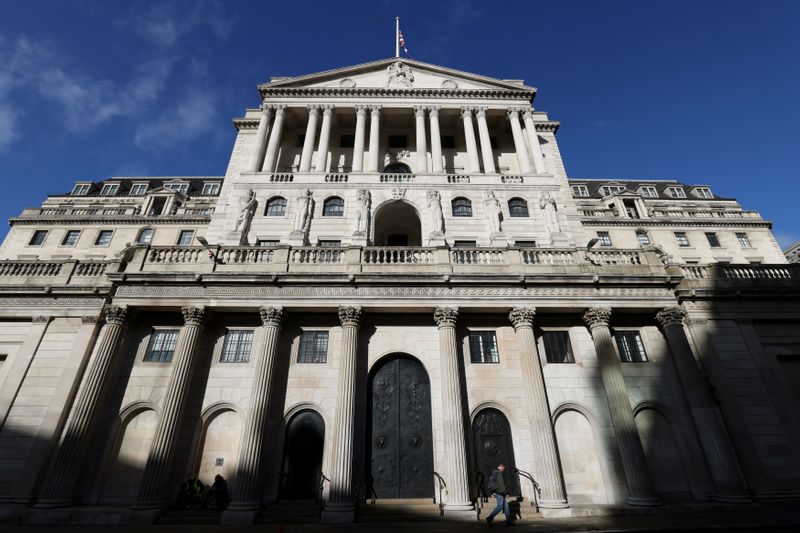By William Schomberg, David Milliken and Andy Bruce
LONDON (Reuters) -The Bank of England kept interest rates on hold on Thursday, wrong-footing investors who had been convinced that it would be the first of the world's big central banks to raise borrowing costs after the COVID-19 pandemic.
The BoE kept alive the prospect of a move soon, saying it would probably have to raise Bank Rate from its all-time low of 0.1% "over coming months" if the economy performed as expected.
But seven of its nine policymakers voted to leave rates unchanged for now - even as they forecast inflation would reach almost 5% in April - so they can see how many people lose their jobs after the recent end of the government's furlough scheme.
The announcement sent shockwaves through markets, sending sterling towards its biggest fall since the early days of the COVID-19 pandemic in March 2020.
The yield on two-year British government bonds fell by the most since the day after the Brexit vote in 2016.
Governor Andrew Bailey rejected a suggestion by a reporter that he was "unreliable boyfriend number two," a nickname first used by a lawmaker to describe former governor Mark Carney, whose signals on rate moves failed to translate into action.
"We are in a situation where the calls are close, they are quite hard but that's just a reflection of the position that we are in," Bailey said. "It's not 'unreliable boyfriend'. We didn't say we were going to act at any particular meeting."
He spoke last month of the need to act to contain inflation expectations.
Bailey said two scheduled labour market data releases between now and the BoE's next rate decision on Dec. 16 could clear up the uncertainty about the labour market but that was not "a strong clue" about when a hike might come.
Investors responded to the BoE's announcement by putting a roughly two-thirds chance on a rate hike in December, much less than the 100% chance they had seen for a hike at November's meeting.
By contrast, a Reuters poll of economists last week showed the average expectation was for the BoE to keep rates on hold.
Only two Monetary Policy Committee members - Deputy Governor Dave Ramsden and Michael Saunders - voted for an immediate 15 basis-point rate hike.
"Pathetic communication from the BoE," Peter Kinsella, head of FX strategy at Swiss bank Union Bancaire Privée, said. "Bailey basically marched us up the hill, and then voted to keep rates steady."
The BoE's cautious approach came a day after the U.S. Federal Reserve said it would start scaling back its bond-buying programme this month, a precursor to its first rate increase which investors expect in mid-2022.
The European Central Bank has been more explicit about its determination to keep the stimulus flowing. Its President Christine Lagarde said the ECB was very unlikely to raise rates next year.
On Thursday, the BoE said the MPC voted 6-3 to let its government bond-buying programme reach its full size of 875 billion pounds ($1.18 trillion). Catherine Mann joined Ramsden and Saunders to vote to scale back that part of the bank's stimulus programme.
Including its 20 billion pounds of corporate bond holdings - which this month will start to be reinvested in greener debt - the total asset purchase target remained at 895 billion pounds.
"VALUE IN WAITING"
The BoE said most MPC members still thought "there was value in waiting" for data on the labour market.
Earlier on Thursday, survey data showed most furloughed workers had returned to their employers on their regular hours after the government programme ended at the end of September.
A recent slowdown in consumer demand also stayed the hand of most MPC members.
The BoE's new forecasts predicted slower economic growth due to continued bottlenecks in global supply chains. Output was seen regaining its pre-pandemic size in the first quarter of 2022, three months later than previously thought.
Growth in 2021 was trimmed to 7% and the forecast for 2022 was cut to 5% from a previous 6% before slowing sharply to 1.5% in 2023 and 1% in 2024.
Inflation was seen jumping to around 5% in April, driven mostly by surging global energy prices, before falling back to just below the BoE's 2% target in three years' time.
That projection was based on the BoE's usual practice of assuming energy prices follow futures for the next six months and then stay unchanged for the rest of its three-year forecast.
However, an alternative scenario, including a drop-off in energy prices in the second half of 2022 which markets expect, showed inflation would be "materially lower" than the BoE's 2% target in 2023 and 2024.
That scenario also factored in previous market expectations that interest rates would hit 1% by the end of next year.

Bailey told investors that the inflation undershoot meant investors should not count on interest rates rising as high as expected if energy prices fell as the futures market predicted.
($1 = 0.7417 pounds)